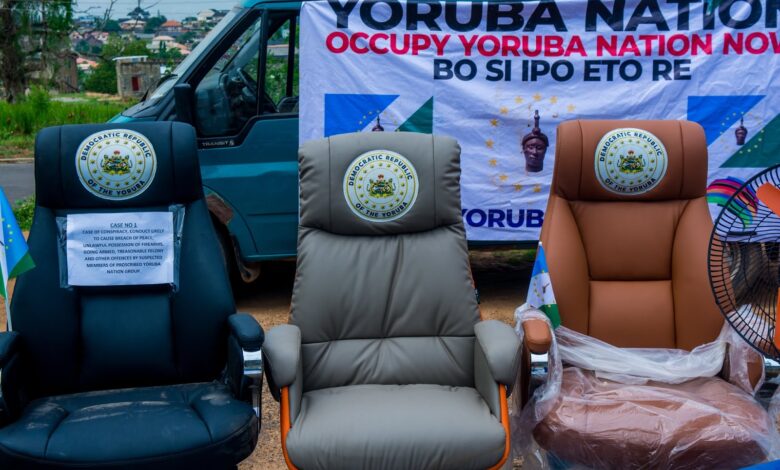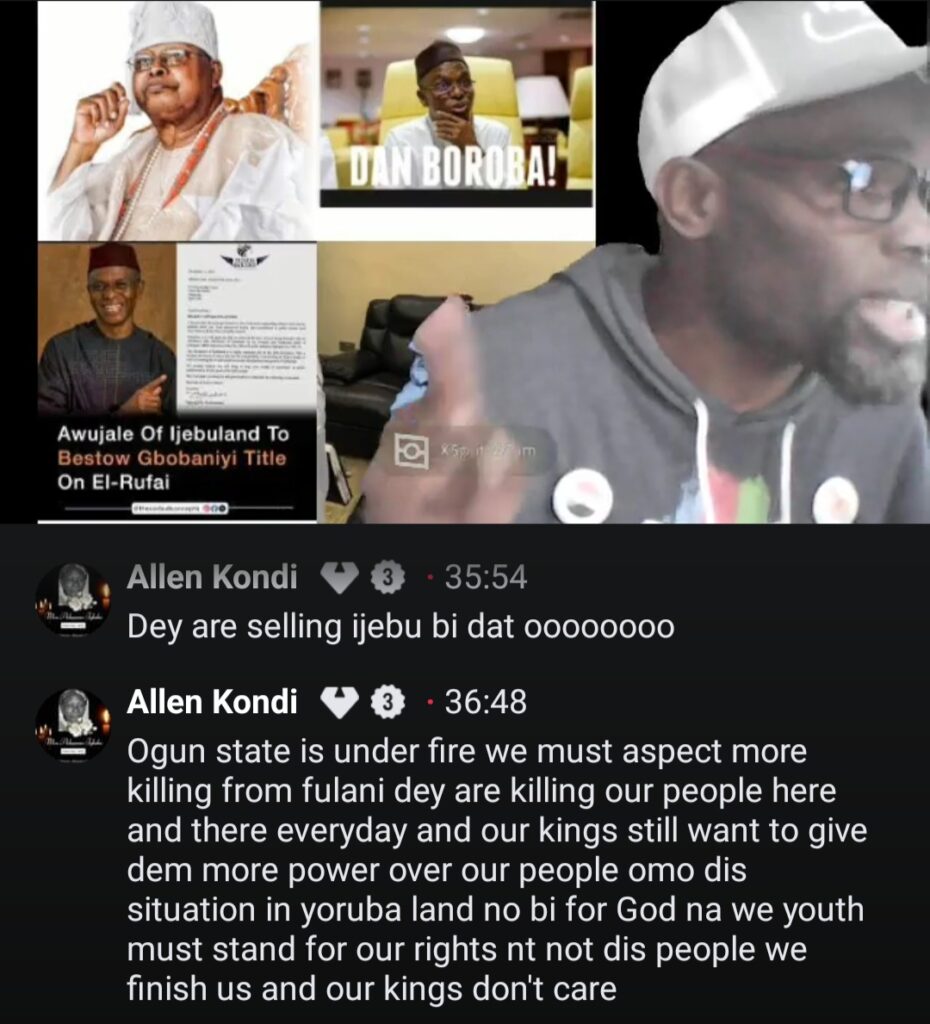The Social Media Warriors Promoting Yoruba Nation Propaganda On Facebook
The separatists calling for the break away from Nigeria are demanding a separate country for the Yoruba ethnic group. They rely on a massive propaganda campaign on social media to attract support for their agitations.

Listen to this article
0:000:00Let’s begin with some background information.
Separatist agitations are not new in Nigeria. It started with Isaac Adaka Boro, an Ijaw ethnic minority rights activist, who led the first major rebellion against the Nigerian state in February 1966. He formed a group known as the Niger Delta Volunteer Force and declared the formation of a Niger Delta Republic. For 12 days, he and his group fought the Nigerian Forces before they were arrested and tried for treason.
Nigeria later went to war in July 1967 after Chukwuemeka Odumegwu Ojukwu declared the Republic of Biafra in the eastern region. Three years later, the war ended after the loss of hundreds of thousands of lives.
One Sunday morning in April 1990, Nigerians woke up to a coup speech by Major Gideon Orkar on Radio Nigeria, announcing the overthrow of Ibrahim Babangida as the military president. Orkar, in his speech, announced the excision of five Northern states – Bauchi, Borno, Katsina, Kano and Sokoto – from Nigeria. He and other colleagues, who wanted to seize the government and redraw the map of Nigeria, were later arrested, charged with treason, convicted, and executed by firing squad.
In 2013, Nigeria saw the emergence of the Indigenous People Of Biafra (IPOB). Led by Mazi Nnamdi Kanu, the group aims to actualise the dream of an independent Biafran Republic. Though Kanu, who has been facing trial since 2016, has repeatedly called on his followers to stop violent attacks in southeastern Nigeria, the region remains unsafe.
Secession talks among Yorubas
During former President Muhammadu Buhari’s administration, there were a series of killings and kidnappings in the South West. One of the incidents that ignited anger in the region was the abduction of Olu Falae, a prominent leader in Yorubaland and former Secretary to the Government of the Federation.
Another incident that fueled the annoyance of many was the killing of Olufunke Olakunrin, daughter of Reuben Fasoranti, leader of Afenifere — a socio-cultural organisation for the Yoruba people. She was shot dead by herders while returning to Lagos after a visit to her father in Akure.
Secessionists took advantage of the situation, which was already causing tension between the two ethnicities, to demand a breakaway from Nigeria. First, it was Professor Banji Akintoye, a Yoruba self-determination advocate, who announced ‘Oduduwa Republic’ with a group known as Ilana Omo Yoruba.
He was thereafter joined by a self-styled activist, Sunday ‘Igboho’ Adeyemo, who took many youths to different villages in Oyo and Ogun to illegally evict Fulanis on the account that they were kidnapping and killing Yoruba people. They also had rallies in different states of the region.

Since the steps by Akintoye and Igboho were not in line with the position of mainstream Yoruba leaders demanding restructuring and federalism, the two were condemned and security forces went after Igboho, forcing him to go into exile for three years.
But there’s another faction of the separatist group led by Modupe Onitiri-Abiola, a widow of the late M.K.O. Abiola (renowned politician and businessman), who proclaimed a new country called “Democratic Republic of Yoruba (DRY)” in a video released on Friday, April 12.
She said her group, known as Ominira Yoruba (freedom of Yoruba), got over five million signatures for petitions to have self-determination in 2022. On April 13, gunmen who were said to be Yoruba Nation soldiers invaded the Oyo State government secretariat in Ibadan in military camouflage, attempting to overthrow the government. They removed the Nigerian national flag from the secretariat and replaced it with their “Oodua nation flag”.
After a gun battle with security agents, they were overpowered and arrested. Since the incident occurred, no one knows Modupe’s whereabouts, and no Yoruba leader or group has come out to identify with her.
Propaganda on social media
Known to be US-based, Modupe is one of many Nigerians in the diaspora fueling the agitation for self-determination. She has granted a series of interviews capable of igniting violence. In one of her videos, she said, “Those saying the unity of Nigeria is non-negotiable are the ones behind the disunity of the country.”
In another video watched by over three thousand people, she accused Yoruba monarchs, Afenifere and other social-cultural groups of collecting bribes from the federal government to sell Yoruba people into slavery, as she vowed to defend the territory with arms if need be.

In our search for Modupe’s activities before the invasion of the Oyo secretariat, HumAngle came across a YouTube channel (GREEN4GOD TV) that appeared to have been created specifically to amplify the separatists’ videos and audio campaigns. The channel has since 2022 uploaded over 100 videos and audio programmes of Modupe and her group members, in which they share false claims about Nigeria’s political structure to lobby unsuspecting audiences.
Like her, Sunday Igboho, in 2021, employed the service of Olayemi Koiki, a UK-based blogger who runs a Pro-Yoruba Nation Facebook page, Koiki Media, as his spokesperson.
The page, which was created on Feb. 3, 2018, has 16 administrators based in Nigeria, four in the United Kingdom, one in Kenya, and one in Turkey. It is notorious for sharing articles, audio recordings, and videos promoting secession. Reacting to Akinwunmi Adesina, president of the African Development Bank (AfDB), who proposed a name change for Nigeria to the “United States of Nigeria”, Koiki Media in a two-hour live broadcast monitored by HumAngle shared videos of secessionists making false claims such as “there’s no land called Nigeria” and “there are no people called Nigerians.”
“We are telling Dr Akinwunmi Adesina that we, the sons and daughters of Yoruba land that are his younger brothers, love him and appreciate him but currently against his propos(sal) to remain inside this contraction and evil entity forced on 220 million innocent people that did not negotiate amalgamation. Whenever we hear the word proposal (of unity), we should speak out and reject it. Maybe Adesina is working for the internal people against Yoruba. We are tired of the shithole country called Nigeria. What we want to hear is Independent Yoruba country or nothing else,” he said as many of the over 1,000 viewers on the live programme proposed violence.
An inciting comment that stood out was that of Kenzy Abiola Fapohunda, who said, “Tell him they have the same plan. We need to fight him because he is working for them. Let us break it down.”
In another live broadcast reacting to a chieftaincy title bestowed on former governor of Kaduna Nasir El-Rufai by the Awujale of Ijebuland, Oba Sikiru Adetona, in December 2023, Olayemi Koiki, falsely claimed that Ijebuland is not part of Nigeria and as such, El-Rufai isn’t entitled to the chieftaincy honour.
HumAngle discovered that Olayemi often uploads videos of respected individuals out of context to mislead his followers and deceive them into thinking such individuals support Yoruba Nation’s agitation.

There are many others
Travels vlogs is another example of a page run by Nigerians in the diaspora who often fan the embers of war in the name of secession. The administrator, Solomon Okereke, is apparently based in Israel and is both a Pro-Yoruba Nation and a Pro-IPOB agitator. Many of the videos on his Facebook page prominently feature tirades against the Fulanis. In one video from August 2021, he incited his audience against Fulani people.
“We abroad are not supposed to do anything agitating from abroad because they have houses and families abroad. They come to social media and try to open people’s eyes… Some people are still making love and babies, but they don’t know that Fulanis have taken over the whole Nigeria. This is an ideology going on for years. Nnamdi Kanu shouldn’t have anything to do with Nigeria. We are here telling you that the Fulanis have the ideology of taking over Nigeria and you people are just sleeping. You don’t have data. Una no get data to dey hear news. Fulani herdsmen are all terrorists,” he said.
The video was viewed by at least 32,000 people and shared over 500 times.
Ayo Ojajune is another staunch advocate of secession who does not believe Nigeria should remain one country. According to his Facebook profile, he is a linguistics lecturer at the University of Lagos, a visiting lecturer of Ethnolinguistics at the Institute of Asian and African Studies, Moscow State University and a visiting associate professor of linguistics at Russian Peoples’ Friendship University, Moscow.
There’s also Basirumustafa Thinkyorubafirst, whose original name is Elochukwu Ohagi. In one of the posts on Jan. 20, he wrote that he was “totally against unity in diversity, for there is no unity in diversity. People of the same language, worldview and culture are meant to be together. It is an aberration to bring different disagreeing people together and think there will be peace”.
“I think that the millions of killings that have happened in Nïgeria are a result of the British atrocity of the amalgamation of 1914 … I believe that Africa can be at peace and united if we can break the walls created by the Europeans in the name of creating a nation for us, and go back to indigenous nations as nature made it. This is why I believe in Biafra restoration. This is why I stand with IPOB. This is why I call Mazi Nnamdi Kanu my leader … Hausa can do better in their farming and Fulani can always rear their livestock. Why should we suffocate in the name of forced unity when we can divide this country in peace breath?”
HumAngle has observed many more accounts, pages, and groups spreading similar narratives, especially on Facebook.
The Oyo State Magistrates Court, on April 18, remanded 29 Yoruba Nation agitators after a failed coup. However, more attention needs to be paid to how social media platforms are used to sow seeds of propaganda, hate, and violence in ways that could radicalise supporters of the campaign.
Although Facebook says it employs a combination of artificial intelligence and human monitors to identify and remove terror-related content, much work remains to tame extremist propaganda.
Support Our Journalism
There are millions of ordinary people affected by conflict in Africa whose stories are missing in the mainstream media. HumAngle is determined to tell those challenging and under-reported stories, hoping that the people impacted by these conflicts will find the safety and security they deserve.
To ensure that we continue to provide public service coverage, we have a small favour to ask you. We want you to be part of our journalistic endeavour by contributing a token to us.
Your donation will further promote a robust, free, and independent media.
Donate Here


